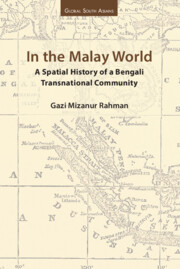Book contents
- Frontmatter
- Dedication
- Contents
- List of Maps
- List of Tables
- List of Figures
- List of Graphs
- Notes on Weighing Scale
- Note on Place Names
- Acknowledgements
- List of Abbreviations
- Prelude
- 1 Contexts, Routes and Nodal Points
- 2 The Bengali: Terminological Ambiguity and Demographic Profile
- 3 Governance of Migration and Diaspora
- 4 Professionals and the Working Class
- 5 In the World of Trade and Commerce
- 6 Tales of Tears, Fears and Pleasures
- 7 The Making of a Diasporic Space: Social and Political Dimensions
- 8 The Making of a Diasporic Space: Civil Society
- Epilogue
- Appendix
- Glossary
- Bibliography
- Index
Prelude
Published online by Cambridge University Press: 28 November 2024
- Frontmatter
- Dedication
- Contents
- List of Maps
- List of Tables
- List of Figures
- List of Graphs
- Notes on Weighing Scale
- Note on Place Names
- Acknowledgements
- List of Abbreviations
- Prelude
- 1 Contexts, Routes and Nodal Points
- 2 The Bengali: Terminological Ambiguity and Demographic Profile
- 3 Governance of Migration and Diaspora
- 4 Professionals and the Working Class
- 5 In the World of Trade and Commerce
- 6 Tales of Tears, Fears and Pleasures
- 7 The Making of a Diasporic Space: Social and Political Dimensions
- 8 The Making of a Diasporic Space: Civil Society
- Epilogue
- Appendix
- Glossary
- Bibliography
- Index
Summary
A thousand years have I been roaming the world's pathways,
From Ceylon to Malaya in darkness of night across oceans
Much have I traveled; in the grey universe of Bimbisara, Ashoka,
Yes, I was there; deeper in the darkness in Vidarbha metropolis,
A weary soul, I, life's waves all around foaming at the crest,
A moment or two of peace she gave me, Natore's Banalata Sen.
Jibanananda Das, a leading Bengali poet of the twentieth century, never travelled to the Malay Peninsula. However, in an allegorical verse in his famous poem ‘Banalata Sen’, an ode to the eponymous eternal woman, Das expressed that he had travelled for thousands of years from Sri Lanka to the Malay world to attain a moment of peace. His literary mind knew no bounds. Though his journey was a fantasy of love, it gives us a sense of the constant flow of Bengali mobility and culture between the two coasts of the Bay of Bengal and the Malay Sea. Factually, the Bengalis did voyage to the Malay Archipelago over the course of a thousand years. This truth fuelled the imagination of the Bengali poets, as reflected in Das's verse. With the advent of British colonialism, Bengali mobility took a new turn, and Das's verse reflects its nodal points in the eastern Indian Ocean domains during the late colonial period.
The trans-regional mobility of peoples, goods and cultures and its attendant space-making is the central theme of this book. Although studies of connected histories have flourished in the past few decades in the Global South, Bengali historical diasporic experiences have remained largely unexplored. With a focus on the historical mobility of the Bengalis from both Bangladesh and West Bengal of India, the book argues that there was robust Bengali trans-regional mobility in the Malay world, a story that has been largely lost in the narrative of ‘Indian’ migration.
By the turn of the twenty-first century, the total number of Bangla-speaking migrants from Bangladesh in the Malay world was approximately 900,000, the vast majority being in Malaysia, followed by Singapore and Brunei Darussalam (hereinafter Brunei).
- Type
- Chapter
- Information
- In the Malay WorldA Spatial History of a Bengali Transnational Community, pp. 1 - 26Publisher: Cambridge University PressPrint publication year: 2025

